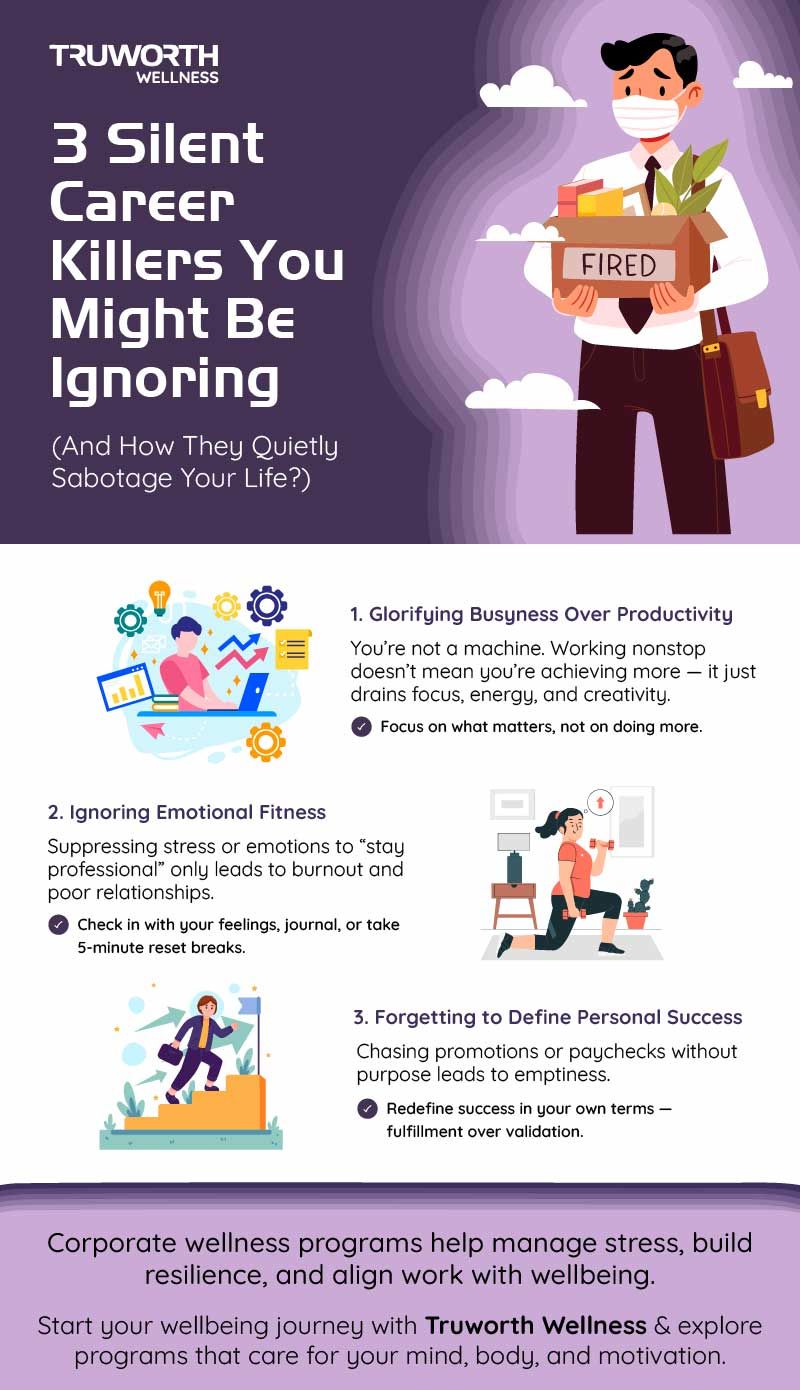3 Silent Career Killers That Maybe Draining Your Success (Without You Realizing It)

Ever felt like you’re doing everything right at work but still feel exhausted, uninspired, or stuck? You’re not alone. Many professionals, even the most high-performing ones, unknowingly fall into habits that seem harmless on the surface but quietly drain their energy, joy, and long-term success.
In the corporate race, these small missteps can grow into burnout, dissatisfaction, and even health issues. What’s tricky is that these mistakes don’t show up immediately. They creep in silently, becoming part of your “normal” routine until one day you realize something feels off—you’re achieving, but not thriving.
Let’s uncover three such mistakes that might be holding you back without you even realizing it.

Glorifying Busyness Over Productivity
“I’m so busy” has become a modern badge of honor. We often confuse being busy with being productive, believing that the more we do, the more we achieve. But in reality, this mindset can backfire.
Constantly juggling tasks, skipping breaks, and multitasking may give an illusion of efficiency, but it actually scatters focus. Over time, this leads to decision fatigue, poor creativity, and chronic stress. The human brain isn’t designed to function at full throttle all day; it needs recovery time to perform at its best.
Many employees unknowingly link self-worth with how “occupied” they appear. They respond instantly to emails, take on extra projects, and stretch their schedules just to feel productive. But true productivity comes from clarity and intention, not chaos.
How this affects your life?
- You end up working harder but achieving less.
- Your mental bandwidth shrinks, making problem-solving and innovation harder.
- Personal time gets squeezed out, affecting relationships and self-care.
When you consistently run on empty, your energy dips and motivation drops. Even enjoyable tasks start to feel like burdens. This is often how burnout begins—not overnight, but in small, unnoticed steps.
The fix: Shift your mindset from “I need to do more” to “I need to do what matters most.” Try using simple tools like:
- Time blocking: Dedicate focused time slots for deep work and short breaks.
- Priority mapping: Pick three key tasks daily that truly drive results.
- Mindful breaks: Step away from screens every 90 minutes to refresh your mind and body.
Productivity isn’t about filling hours. It’s about making those hours count. And sometimes, the most productive thing you can do is pause.
Ignoring Emotional Fitness
In most workplaces, physical health gets the spotlight through gym memberships, step challenges, and diet plans. But emotional fitness is the hidden pillar of lasting success.
Emotional fitness means being able to manage your thoughts, stress, and reactions effectively. Unfortunately, many professionals push their emotions aside in the name of professionalism. They suppress frustration, avoid difficult conversations, or pretend to be fine even when mentally exhausted.

It’s easy to believe that being emotional equals being weak. Yet, ignoring emotions is what drains strength over time. Without emotional regulation, even the most skilled employee can struggle with teamwork, motivation, and resilience during challenges.
How this affects your life?
- Emotional suppression builds up as chronic tension, anxiety, and fatigue.
- Poor emotional regulation can lead to misunderstandings or conflicts at work.
- Over time, you might lose motivation and experience burnout.
Emotionally unfit workplaces often become environments of quiet frustration and invisible stress. Employees might not voice it, but the tension shows in body language, reduced creativity, and a decline in overall morale.
The fix: Check in with yourself daily by simply asking, “How am I feeling right now?” Labeling emotions helps manage them better.
- Build your emotional vocabulary. The better you can name what you feel, the better you can handle it.
- Practice micro-resilience through small habits like short breathing pauses, journaling, or gratitude notes that reset your mood in minutes.
- Seek support through wellness coaches, therapy sessions, or guided emotional wellbeing programs that help strengthen your emotional awareness.
Emotional intelligence isn’t a soft skill anymore. It’s a survival skill in today’s demanding corporate world.
Forgetting to Define Personal Success
This one is subtle but life-changing. Many professionals chase predefined success metrics such as titles, salaries, and awards without pausing to ask, “What does success mean to me?”
When success is measured only by external validation, you might climb the ladder fast but end up at the wrong wall.
Most people never take time to reflect on their inner drivers. They get caught up in comparison; seeing colleagues get promoted or switch jobs—and start believing that’s what they should be doing too. But without clarity, this constant comparison breeds dissatisfaction and confusion.
How this affects your life?
- You may feel accomplished but empty.
- You start comparing your journey with others, leading to imposter syndrome.
- You feel restless even when everything looks perfect on paper.
The fix: Redefine success on your own terms. Maybe it’s flexibility, impact, or continuous learning.
- Set value-based goals. Instead of saying “I want a promotion,” say “I want a role where I can lead creative projects.”
- Reflect often. Ask yourself every few months, “Is my work still aligned with who I want to be?”
- When your version of success aligns with your values, you stop chasing and start living. Personal success is deeply individual—it’s about designing a life that feels right, not one that merely looks right.
How Corporate Wellness Programs Help You Avoid These Mistakes?
While personal awareness is key, structured wellness programs can accelerate this transformation. Many organizations today are realizing that employee wellbeing isn’t just an HR initiative; it’s a strategic advantage.
Corporate wellness programs focus on the whole person, combining physical, emotional, and psychological well-being. Here’s how they make a difference:
1. Combatting Busyness Culture:
Wellness programs promote mindful work habits through digital detox challenges, guided focus sessions, and energy management workshops. These initiatives remind employees that rest and reflection are productivity tools, not signs of laziness.
2. Building Emotional Fitness:
Through expert-led counselling, emotional well-being webinars, and stress management modules, wellness programs help employees understand and express emotions constructively. Regular sessions on empathy, resilience, and mindfulness foster emotionally strong teams that handle pressure better.
3. Redefining Success at Work:
Wellness programs often include life coaching and self-assessment tools that encourage employees to define success based on personal growth and life satisfaction, not just performance ratings. This shift cultivates healthier motivation and long-term loyalty.
Companies that invest in such programs often notice improved engagement, reduced absenteeism, and stronger retention. More importantly, employees start feeling seen not just as workers, but as humans with real emotions, needs, and aspirations.
Final Thoughts: Awareness Is the Real Power
Most corporate mistakes aren’t made out of ignorance but because we operate on autopilot. We get so used to the daily grind that we stop noticing what it’s doing to us. The moment you become aware, you gain control.
Start by making small shifts. Take mindful breaks, protect your emotional energy, and define what a good life truly means to you.
The goal isn’t just to make a living. It’s to make a life that feels worth living.
Truworth Wellness Tip
If you often feel drained, directionless, or emotionally stuck despite working hard, it might be time for a deeper reset. Explore Truworth Wellness programs that focus on emotional wellbeing, stress management, and holistic health coaching to help you thrive both at work and in life.
